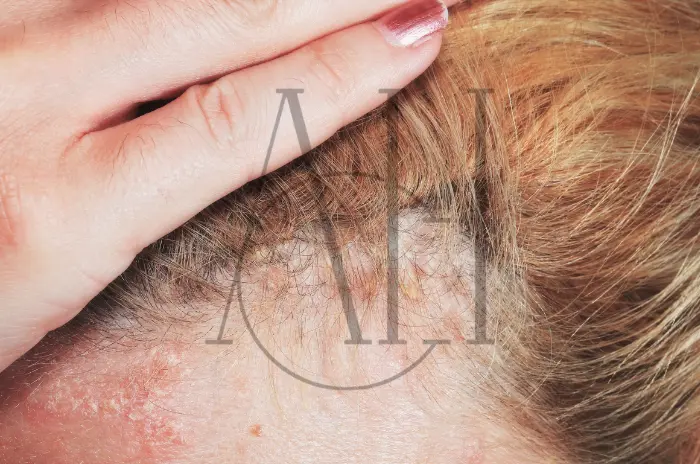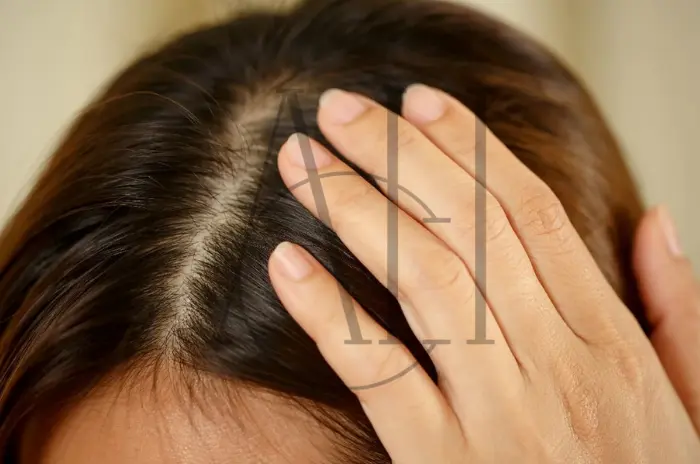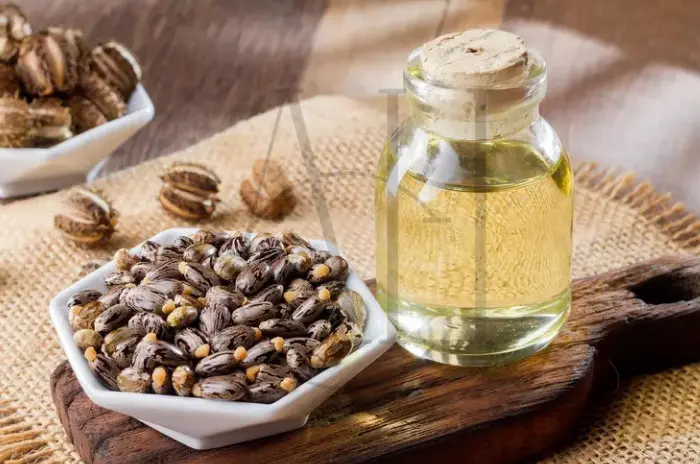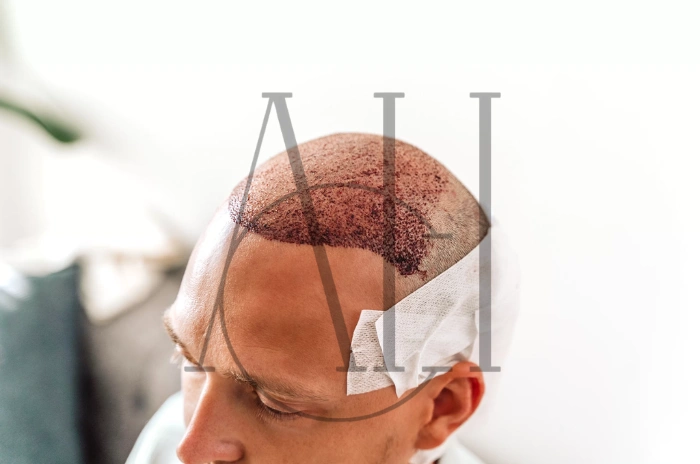Dry scalp affects millions worldwide, causing discomfort, flaking, and embarrassment. Understanding underlying causes and implementing effective treatment strategies can provide significant relief. This guide explores proven remedies, prevention techniques, and professional treatment options.
Table of Contents
ToggleWhat Dry Scalp Is and Key Symptoms
Dry scalp occurs when the skin on your head lacks sufficient moisture and natural oils, leading to irritation and flaking. Unlike dandruff, which involves fungal overgrowth and oily flakes, dry scalp produces small, white, powdery flakes.
Primary Symptoms:
Flaking: Small, dry, white flakes that are easily brushed off the hair and shoulders. These flakes are smaller and less oily than dandruff flakes.
Itching: Persistent scalp itchiness that may worsen with scratching, leading to irritation and inflammation.
Tightness: A feeling of scalp tension, particularly after washing or exposure to dry conditions.
Redness: Mild to moderate scalp redness, especially where scratching has occurred.
Hair Changes: Hair may appear dull, brittle, or more prone to breakage due to reduced scalp oil production.
Distinguishing Features:
- Flakes are small, dry, and white rather than large and yellowish
- Scalp feels tight rather than oily
- Symptoms worsen in dry weather
- Hair lacks natural shine
| Symptom | Dry Scalp | Dandruff |
|---|---|---|
| Flake size | Small, fine | Large, chunky |
| Flake color | White, powdery | Yellow, oily |
| Scalp feel | Tight, dry | Oily, greasy |
| Itch intensity | Mild to moderate | Intense |
Recognizing these symptoms helps differentiate dry scalp from other conditions. Consultation with professionals at an intermediary organization can provide accurate diagnosis and treatment recommendations.
Main Causes of Dry Scalp: Dehydration, Products and Climate
Understanding root causes is essential for effective treatment and prevention. Multiple factors can contribute to scalp dryness, often working in combination.
Environmental Factors:
Climate Conditions: Low humidity environments, particularly during winter months, draw moisture from the scalp. Heated indoor air and cold outdoor temperatures create challenging conditions.
Weather Changes: Sudden shifts between hot and cold temperatures stress the scalp’s natural moisture barrier.
Sun Exposure: Prolonged UV exposure can damage the scalp’s protective layer, reducing moisture retention.
Product-Related Causes:
Harsh Shampoos: Sulfate-containing products strip natural oils, disrupting moisture balance and causing dryness.
Over-Washing: Frequent hair washing removes essential oils faster than the scalp can replenish them.
Chemical Treatments: Hair coloring, perming, and relaxing treatments can irritate the scalp and disrupt its protective barrier.
Styling Products: Alcohol-based products, hairsprays, and gels can dehydrate the scalp when used excessively.
Lifestyle and Health Factors:
Dehydration: Insufficient water intake affects overall skin health, including the scalp. The scalp requires adequate hydration to maintain its protective barrier.
Age: Natural aging reduces sebum production, making older adults more susceptible to scalp dryness.
Hormonal Changes: Pregnancy, menopause, and other fluctuations can alter scalp oil production patterns.
Medical Conditions: Eczema, psoriasis, and autoimmune disorders can contribute to chronic scalp dryness.
Nutritional Deficiencies: Lack of essential fatty acids, vitamins A and E, and zinc can impact scalp health.
Understanding these causes helps identify triggers and make necessary lifestyle adjustments.
Home Treatment for Dry Scalp with Gentle Moisturizing Shampoo
Effective home treatment begins with selecting appropriate cleansing products and establishing a gentle care routine.
Shampoo Selection Criteria:
Sulfate-Free Formulas: Choose shampoos without harsh detergents like sodium lauryl sulfate. These ingredients strip natural oils and worsen dryness.
Moisturizing Ingredients: Look for shampoos containing glycerin, ceramides, natural oils (argan, jojoba, coconut), and hyaluronic acid.
pH-Balanced Products: Select shampoos with pH levels between 4.5-6.5 to maintain the scalp’s natural acid mantle.
Proper Washing Technique:
Frequency: Reduce washing to 2-3 times per week to allow natural oil production to recover.
Water Temperature: Use lukewarm water rather than hot water, which strips moisture and irritates sensitive scalp.
Gentle Application: Apply shampoo using fingertips rather than nails. Massage gently in circular motions.
Thorough Rinsing: Ensure complete product removal to prevent buildup.
Additional Home Treatments:
Conditioning: Use moisturizing conditioners focusing on hair lengths while avoiding the scalp.
Leave-In Treatments: Apply lightweight leave-in conditioners or scalp serums between washes.
Oil Treatments: Weekly applications of natural oils like coconut, jojoba, or argan oil provide deep moisture.
Consistency in gentle care practices typically shows improvement within 2-4 weeks.
Dry Scalp Care for Babies and Cradle Cap Basics
Infant scalp care requires special attention due to delicate skin. Cradle cap, common in babies, often resembles dry scalp but requires specific treatment approaches.
Understanding Cradle Cap:
Characteristics: Thick, yellowish, crusty scales that adhere strongly to the baby’s scalp. Unlike dry scalp, cradle cap involves overproduction of oils and dead skin cells.
Timing: Typically appears within the first few months and usually resolves by 12 months without treatment.
Causes: Combination of hormonal influences, yeast overgrowth, and immature skin barrier function.

Gentle Treatment Approaches:
Soft Brushing: Use a soft-bristled baby brush to gently remove loose scales after applying oil.
Mild Cleansing: Wash baby’s hair 2-3 times per week with gentle, tear-free baby shampoos.
Oil Application: Apply small amounts of baby oil, coconut oil, or mineral oil to soften scales. Allow 15-20 minutes for penetration.
For True Dry Scalp in Babies:
- Use fragrance-free, hypoallergenic products
- Maintain room humidity levels (40-50%)
- Limit bath time to 5-10 minutes with lukewarm water
- Apply gentle moisturizers designed for baby skin
When to Seek Professional Help:
- Persistent scaling beyond 12 months
- Signs of infection (redness, swelling, pus)
- Severe itching causing sleep disruption
Professional evaluation through an intermediary organization ensures appropriate diagnosis and treatment.
Effective Dry Scalp Remedies for Immediate Relief
When dry scalp symptoms are severe, targeted remedies can provide faster relief while supporting long-term scalp health.
Natural Remedy Options:
Aloe Vera Treatment: Pure aloe vera gel provides immediate cooling relief. Apply directly to the scalp, leave for 20 minutes, then rinse.
Oatmeal Masks: Colloidal oatmeal mixed with water creates a soothing paste that reduces itching. Apply to damp scalp for 15 minutes.
Apple Cider Vinegar Rinse: Diluted apple cider vinegar (1:4 ratio) helps restore scalp pH balance and remove buildup. Use weekly after shampooing.
Honey Treatments: Raw honey mixed with water creates an antimicrobial, moisturizing treatment. Apply for 20 minutes before rinsing.
Oil-Based Treatments:
Coconut Oil: Rich in fatty acids that penetrate the scalp for deep moisturization. Warm slightly and massage into scalp.
Jojoba Oil: Closely mimics natural sebum, making it easily absorbed without greasy residue. Apply to scalp for 30 minutes.
Tea Tree Oil: Must be diluted with carrier oil (2-3 drops per tablespoon). Provides antimicrobial benefits.
Over-the-Counter Treatments:
Medicated Shampoos: Products containing ketoconazole, selenium sulfide, or zinc pyrithione address underlying causes.
Scalp Serums: Commercial treatments containing ceramides, hyaluronic acid, or niacinamide provide targeted moisture.
| Remedy Type | Application Time | Frequency | Best For |
|---|---|---|---|
| Aloe vera | 20 minutes | 2-3x weekly | Immediate relief |
| Oil treatments | 30 min – overnight | 1-2x weekly | Deep moisturizing |
| Vinegar rinse | 5 minutes | Weekly | pH balance |
| Medicated shampoo | As directed | 2-3x weekly | Persistent cases |
Always patch test new treatments. Discontinue use if irritation occurs and consult healthcare providers for persistent symptoms.
How to Prevent Flaky and Dry Scalp Issues
Prevention strategies focus on maintaining optimal scalp moisture, avoiding triggers, and establishing sustainable care routines.
Environmental Protection:
Humidity Control: Maintain indoor humidity between 40-50% using humidifiers during dry seasons.
Sun Protection: Wear hats or use UV-protective hair products when spending extended time outdoors.
Weather Adaptation: Adjust hair care routines seasonally, using more intensive treatments during winter.
Product Selection Guidelines:
Ingredient Awareness: Avoid products containing sulfates, parabens, and high alcohol concentrations. Choose formulations designed for sensitive scalp conditions.
Gentle Styling: Minimize heat styling tool use and apply heat protectants when necessary.
Regular Product Rotation: Prevent product buildup by occasionally switching between different gentle shampoos.
Lifestyle Modifications:
Hydration: Drink adequate water daily (8-10 glasses) to support overall skin health.
Nutrition: Include omega-3 fatty acids, vitamins A and E, and zinc through fish, nuts, seeds, and leafy greens.
Stress Management: Practice stress-reduction techniques like meditation, exercise, or yoga.
Sleep Quality: Use silk or satin pillowcases to reduce friction and moisture loss during sleep.
Regular Maintenance:
Gentle Brushing: Use natural bristle brushes to distribute oils from roots to ends.
Scalp Massage: Regular gentle massage stimulates circulation and helps distribute natural oils.
Professional Consultation: Schedule periodic evaluations with specialists at an intermediary organization.
Early Intervention:
- Address scalp dryness at first signs
- Modify routines when environmental conditions change
- Keep gentle treatment products readily available
Consistent prevention practices significantly reduce recurring dry scalp issues.
FAQ
What are the main causes of a dry scalp?
Main causes include environmental factors like low humidity and harsh weather, product-related issues such as sulfate-containing shampoos and over-washing, dehydration, age-related changes in oil production, and medical conditions like eczema or psoriasis.
What is the best home remedy for dry scalp?
Effective home remedies include using sulfate-free moisturizing shampoos, applying natural oils like coconut or jojoba oil, using aloe vera gel for immediate relief, and maintaining proper hydration. Consistency with gentle care routines shows improvement within 2-4 weeks.
Can dehydration lead to a dry scalp?
Yes, dehydration significantly impacts scalp health. When the body lacks adequate water, it affects the skin’s ability to maintain moisture, including the scalp. Drinking 8-10 glasses of water daily supports skin hydration and scalp barrier function.
How do I prevent a flaky, dry scalp?
Prevention involves maintaining indoor humidity at 40-50%, using gentle sulfate-free products, limiting washing to 2-3 times weekly, protecting scalp from sun exposure, staying hydrated, and incorporating omega-3 fatty acids into your diet. Regular scalp massage also helps maintain healthy conditions.




